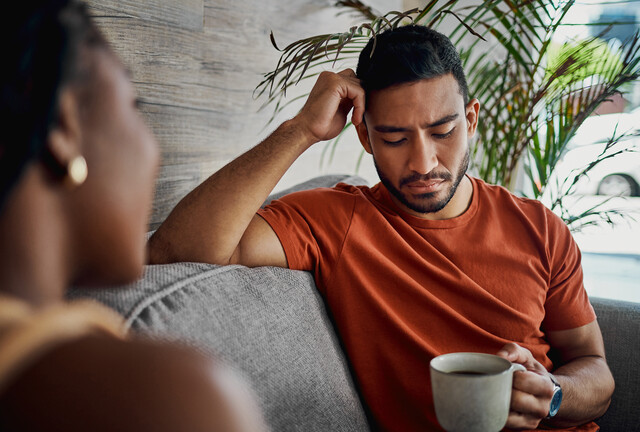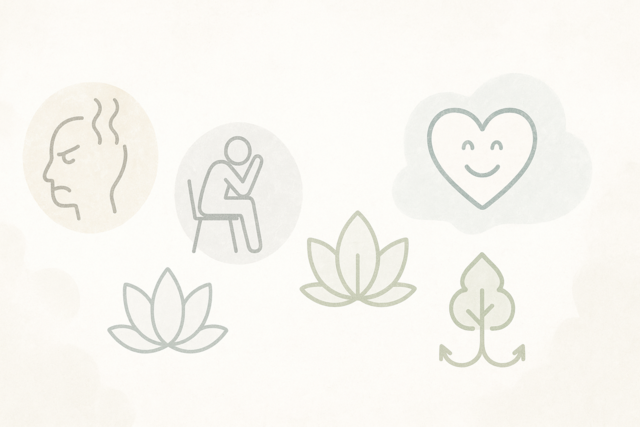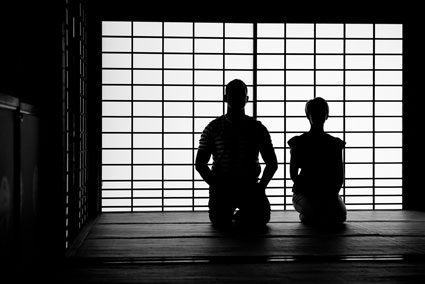Social anxiety can make it feel like that is the only part of your identity that exists. It's an annoying and overwhelming and frustrating part of your life that happens to be involved in every other aspect. Many simply want to see themselves beyond their social anxiety, but it is such an integral part of them that it brings into question who they actually are.
Knowing who you are, both as a person with social anxiety and simply as a person, can help you overcome your social anxiety. As much as you may not want it to be, your social anxiety is a part of your life and it is going to impact who you are. So, in order to develop an understanding of how to overcome your social anxiety, you need to understand who you are as a person.
Why Is It Important To Know Yourself?
Learning about yourself in an effort to help your social anxiety is important for a number of reasons. Your social anxiety is a part of your identity that you cannot entirely remove. As a result, knowing yourself allows you to know about who you are with your social anxiety and who you are without it. That understanding can be used to figure out how to work with and around your social anxiety, what your strengths and weaknesses are and how you can use them to your advantage.
� Understanding Your Social Anxiety--Knowing about yourself allows you to understand your social anxiety in a way that benefits you. Recognizing what is "you" versus what is the social anxiety gives you an advantage because you know what you need to tackle. It's like the preparation before a battle and identifying your target. That information can be used to determine things like the specific causes of your social anxiety, what treatment approaches can be done, and how it really affects you. What is its weakness? What strengths does it have? What works well against it? What doesn't?
The process of understanding yourself and your social anxiety will vary from person to person. Everyone's different, both in terms of their personality and in terms of their social anxiety. However, the common element that will be necessary for that process is being honest with yourself. You cannot clearly differentiate between you and your social anxiety if you lie to yourself about that difference. Ask questions about yourself and your social anxiety. Look at the details, both big and small. Find the line that divides you and your social anxiety and mark it.
-
Who Are You Sans Social Anxiety?--Social anxiety affects a person in so many ways that it can be hard for them to tell what part of their personality is solely theirs and what is from the anxiety. The skewed way that social anxiety makes a person view themselves is highly negative. They de-value themselves because that is what their social anxiety convinces them to do. Trying to bypass that negativity is often key to understanding yourself.
Think about things that you like--your interests, your likes, your dislikes. Figuring out who you are without the influence of your social anxiety means, well, figuring out who you are. It can mean finding yourself, but taking the long spiritual journey that you see in the movies isn't a requirement. You can simply ask yourself questions about yourself, just as you ask questions about your social anxiety. Again, find that line and mark it.
-
What Are Your Strengths and Weaknesses?--Knowledge of what your strengths and weaknesses are can make them valuable resources. They can be used to your advantage against your social anxiety and can help you keep yourself separate from it. Your strengths are going to allow you to stand above your social anxiety and keep it at bay when you need to. Your weaknesses will allow you to know what you are and are not capable of, and give you a goal for growth.
Figuring out what your strengths and weaknesses are requires you to reflect on yourself and your past. Think about moments when you were able to overcome your social anxiety. What did you do? What were the circumstances of the situation? What outside factors were involved? Do the same for your weaknesses and think about what was going on when your social anxiety got the best of you. Is there something that you did on one occasion that you didn't do in another that made up for the difference?
Knowing Yourself Mentally
Since social anxiety is a predominately mental health issue, looking at who you are mentally is often necessary. Social anxiety lives within a person's psychology and their mind is the first place that its actions occur. Looking at how you think and how your mind operates is what will be done during cognitive-behavioral therapy, a treatment option for social anxiety. Being aware of your own mentality, both in regards to yourself and your social anxiety, is another part of knowing yourself.
-
How Does Social Anxiety Affect Your Mind?--Look at what your social anxiety does to you mentally, specifically the symptoms that arise when there's a response. What thoughts and feelings do you have during an anxiety attack? How does your mind respond to certain circumstances? Think about minor anxiety responses all the way through to major ones. Social anxiety disorder is selective, and each person's anxiety is going to manifest differently. Look at what happens and when it happens. Put aside the expected or theorized response that your social anxiety is suppose to have and look at what it does for you.
As the mind controls the body's functions and actions, you will then need to look at what the mental response does to your body. What thoughts or feelings proceed which physical symptoms? Is there a combination that seems to occur in every instance or during a specific set of circumstances? How do those physical symptoms then affect your mental response to your social anxiety? Social anxiety may be primarily mental, but it affects everything beyond that as well. Being aware of those affects that social anxiety has one you and how they interact with one another is something you should be aware of. It's another part of you, and understanding it is necessary for you to figure out who you are.
-
Are You Able To Recognize It?--When social anxiety kicks in, it can be difficult to see through it. This can not only affect how you cope, but your ability to recognize that your social anxiety is active. It's like having blinders on; you may know that it's happening once it's fully kicked in, but not necessarily pick up on it as it starts. Part of it is because your social anxiety can manifest in so many ways and at a different pace depending on the circumstances. Each instance isn't necessarily going to be the same as the last one, nor will the one after it.
Knowing who you are on a mental level and how your social anxiety affects you mentally can make a difference in how you respond to your social anxiety. You may not be able to see things clearly when faced with a trigger, and reason will probably be the last thing on your mind. If you know what the early signs of your social anxiety are when it starts up at a party, or in a meeting, or while hanging out with friends, you will be able to act accordingly. Recognizing what is going on, as quickly as it happens, can give you the chance to stay yourself. It cuts down on the influence your social anxiety can have and keep you healthy and happy.
Knowing Yourself Socially
All aspects of your life and personality are going to be affected by your social anxiety. It's an unavoidable part of social anxiety, but that doesn't mean that it has to completely shape who you are on a social level. It also doesn't have to limit you socially either. Knowing who you are socially is another necessary part of knowing yourself and knowing your social anxiety. Understanding that part of you and recognizing what separates you from your social anxiety is going to be a key part of overcoming it.
Knowing yourself socially involves looking at what you do, who you do it with, and where you do it. Think about the things that you enjoy doing and the things you don't, even if your social anxiety doesn't always affect them. Your social life, no matter its shape or size, will include many different facets. Look at the social parts of your life that are divided into things like school, work, relationships, and responsibilities. How are you in each one and how do they intersect with one another? How does your social anxiety act in each part of your social life?
You should also take into account the following aspects of your social life in order to get as clear of a picture as possible:
-
What Are You (Un)Comfortable With?--As you become familiar with who you are, you begin to recognize where your comfort zone lies. There are going to be certain places and circumstances that you are going to favor over others, often for a very good reason. Often the places you are most comfortable with are the places you will retreat to when you social anxiety makes things too difficult. They are your safe havens, the places you go because you know you'll be okay when you're there. You can go to those places and circumstances to calm yourself down when your social anxiety takes over. Knowing where and what those comfort zones are can help you create some space between you and your social anxiety.
On the opposite end of the spectrum, there are going to be places and situations that you are absolutely uncomfortable with. Maybe it doesn't matter want modifications are made to fix it, they will still be a no-no for you. There's a reason why they are outside of your comfort zone, just as there is a reason why your comfort zone is what it is. That information can be used to determine why your social anxiety does what it does under those circumstances. You can also use it to your advantage, as there may be times where avoiding them is going to be a necessary part of overcoming your social anxiety.
-
What Are Your Triggers?--Triggers are the things that cause your social anxiety to activate. Triggers are what your social anxiety perceives as a danger, what your mind believes means to cause you harm. They can range from specific details to an entire situation that makes you anxious. Each case of social anxiety is going to be different, so what triggers one person's social anxiety isn't going to be the same for the person next to them. They may be simple everyday things like walking into a room full of people, or having people stare at you.
One thing that you can do to understand who you are in social situations is to make a list of your known triggers. Think about what you have done during a socialization that may have caused your social anxiety to go into effect. What it something you did? The space between you and the person next to you? What about the occasion? Were you making small talk? Who were you interacting with and how well did you know them? Different details in different situations will make up the list of possible triggers.
-
Are You Able To Respond?--Being able to recognize your social anxiety is one thing, while being able to respond to it is another. Some social circumstances make it harder for a person to respond to their social anxiety. It may be the triggers present ignite such an intense response that you feel like you can't do anything about it. Or the people around you don't know you well enough to help you. Whatever it is, some circumstances are not going to be in your favor. Knowing who you are on a social level will allow you to properly gauge your ability to respond to your social anxiety. If you know how your social anxiety affects you, how to recognize when it is, know what circumstances you can act under, you can know how you can respond to it.






























